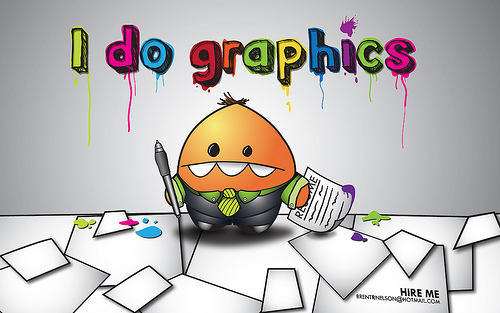“How exactly do you make your paints?”; What if Google hired artists?
Ben and I were chatting about interviews after hearing some horror stories from a friend. He made a jape about how bizarre technical interviews can be, and how we often ignore some really important factors… like a portfolio. A portfolio in this case answers the question of “what exactly have you created?”
I will pick on Google as it is the brunt of the “holy crazy interviews batman” trade, which is made more fun now that my sister-in-law is a recruiter there. I like to tease her. She knows that I am a fan of Google and think it is a fantastic place to work. I would be honored to work there again one day for example. Anyway, she doesn’t need my help in hiring… you have all heard about the food ;)
So, feel free to substitute Google for other high tech companies in any story below.
Imagine if Google interviews painters or artists in the same way that they hired engineers. Michaelangelo would show up, and would be hammered on questions about how he exactly makes and mixes his paints. Why does he use that particular kind? Why do those mixes chemically end up with the result that he desires. “If you were on a dessert island with 3 paints, what would they be and why?”, “Discuss the difference between RGB and CYMK”.
This may feel strange. A natural first step when you talk to an artist to see if they are any good is…. see what they have done! “Can I take a look at some of your pieces?” The artist will then probably show a variety that show a broad range of abilities. Some of you have probably had this experience hiring a wedding photographer.
Now, it isn’t that the process doesn’t matter. You want to chat about that side of things too. The right paint may result in a longer lasting piece. The right technique may result in you not getting annoyed by the photographer at your wedding. But, it is probably secondary to seeing what the person has actually done.
Google of course does a fair amount with art. The Doodles for example…. they have competitions for those, and the tools used may or may not play a factor.
Now, you may argue that the portfolio focus makes much more sense for art than other genres, including programming. You can tell a lot from seeing that art, and it is pretty static in time. Programming though, has to be maintained. It has to live. The “how” matters so much more. Maybe it is more like architecture than art. An architect can be known for his amazing looks, or building experiences, but the building better be structurally sound. You would still look at the portfolio of an architect first though, versus peppering them on structural engineering questions.
You do need to test the portfolio. It is one thing seeing that Bob Harris created an amazing website, a top 10 iPhone app, and contributed to a popular open source project…. but what exactly was the contribution. Projects have many folks involved. This is why you need to test the interviewee. Write some code with them. Talk through a real problem that they would actually have to solve on the job (shock horror). Do you *really* think that they will be implementing bubble sort on the job?
Interviewing itself is an art. It is hard to quickly make a decision on if someone will be a fit. Not only does there have to be a technical match in expectations, but there is the social match that is oh so important when a person joins a collective :) I have already talked about how the current process of hiring is like a shotgun marriage and broken but I definitely feel that in a constrained world there are three things that I favour when interviewing a candidate:
- Understand their portfolio (ask the candidate to come ready)
- Test the candidate to make sure they match with their portfolio (work with them on what they will be doing. E.g. pair on code)
- Talk to key people who know the candidate and learn from them about the person



February 8th, 2010 at 9:33 am
I think you picked a poor example to demonstrate the silliness of some interview processes, because Michelangelo would have known exactly where his paints came from, how they were made, and what dyes were used. It was very important at the time to be on the leading edge of that technology.
Quoting a random dude on the internet:
“They actually went into detail about this in the book I just read ‘Michelangelo and the Pope’s Ceiling’.
He special ordered specific colors from specific places, and was very picky about it.
The book is by Ross King, and was published in 2003. If you can get hold of a copy, just look the word pigment up in the index. It is mentioned on roughly 20 separate pages, and exactly where and how he got specific colors is explained in detail.”
February 8th, 2010 at 10:06 am
Funny you mentioned a portfolio. At the last minute I was inspired to make one for my Palm interview. I think it worked out much better than my pure resume.
February 8th, 2010 at 11:38 pm
Unfortunately, software development is generally a team sport. While people can point to projects that they have been on, it is not always easy to point to significant examples that they can claim as their own, or even feel responsible for failures where they were but a cog in a runaway train.
February 14th, 2010 at 5:33 pm
Frank Lloyd Wright’s buildings are amazing works of art, but are typically very expensive to maintain — he definitely stretched the ability of the materials he had to work with… So I imagine he would never have been asked to build a Google facility :-)
July 9th, 2010 at 3:04 pm
There’s a big difference with a programming portfolio, in that very often the portfolio belongs to an employer, who would be justifiably horrified if a programmer showed it to another company during an interview.
It would be nice if we all worked professionally on open-source projects or public websites, but it’s certainly not the case for programming in general.
There are many programmers with valid portfolios that are veiled in secrecy and are unverifiable.